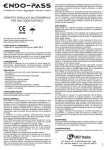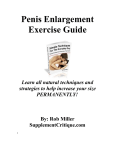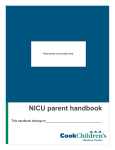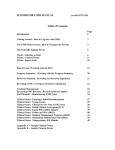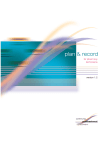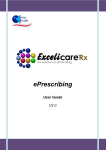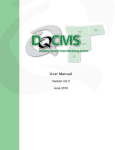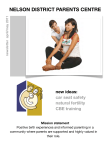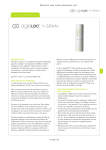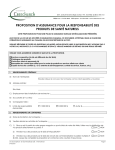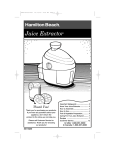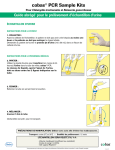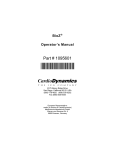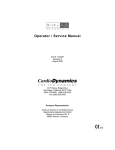Download Natural Strategies for Sexual Dysfunction
Transcript
Natural Strategies for Sexual Dysfunction Introduction Sexual dysfunction in any stage of life can be emotionally devastating. Whether married or single, whether young or old, most people want to have enjoyable sex lives unless they have taken a vow of celibacy. Sexual dysfunction can be the trigger of failed marriages and chronic and major depressive illness. Although sexual attraction is driven by the primitive, non-intellectual part of our brains, our sexual patterns and practices are an integral part of our humanity. In this manual I want to bring you a ray of hope: most sexual dysfunction cases can be treated successfully, without resorting to expensive short-term fixes such as Viagra. Compromised blood supply The primary physiological reason for sexual dysfunction today is a combination of atherosclerosis (literally: clogged arteries) and adverse drug effects. It is usually as simple as that. Neuromuscular health and adequate blood circulation in and near the genital organs – at the base of the penis and clitoris – are what provides men and women with the ability to react to sexual arousal and consummate sexual intercourse successfully and pleasurably. Proper functioning of erectile tissue in the penis and clitoris requires a blood supply at high enough pressure to fill spaces and stiffen the organs. In males, this is what produces the erection, making the penis firm enough to penetrate the vagina. Furthermore, the blood supply to the outer shaft and tip of the penis enhances sensitivity of the nerve endings, making it more sensitive to touch and the stimulation of intercourse, enabling orgasm. In females, adequate blood supply provides for clitoris sensitivity, which is what makes sexual activity most pleasurable and enables orgasm. Blood circulation in arteries is almost universally compromised in humans worldwide, not only in and near the genital organs, by cardiovascular disease and/or diabetes, producing a thin coating of cardiovascular plaques made of a sticky protein called lipoprotein(a). The thickness of this coating increases with age, and at some point the erectile tissue does not function properly. Inadequate blood supply also makes nerves less sensitive. This leaves males with a somewhat insensitive penis that is not firm enough for intercourse, and leaves females with reduced clitoris sensitivity, making it difficult and/or overly time-consuming to reach orgasm. For men over forty there is a common affliction that can also decrease circulation to the penis and prevent erection: prostatitis – an inflamed prostate gland. This gland is the place where semen is manufactured. When it is inflamed, it physically pushes against blood vessels. Fortunately the cause of prostatitis is well known: chronic zinc deficiency. Sufficient zinc and another herb called saw palmetto are included in the regimen in this manual to properly treat prostatitis without drugs. Copyright 2004 Jonathan Campbell. All Rights Reserved. Depression Chronic or even situational depression is a major cause of sexual dysfunction in our society. If you are depressed, your mind just does not respond to sexual signals, and interest in many areas of life – including sex – is lessened. Compounding this problem is the fact that most of the anti-depressant medication available in the U.S., called SSRIs, also reduces sexual libido and performance. The most common complaint of people using SSRI anti-depressant medications is sexual dysfunction. Fortunately, depression can be conquered by natural, non-drug means. For short-term help, there is a relatively inexpensive anti-depressant and anti-anxiety herbal medicine called 5-HTP, which is the direct precursor of serotonin. See below for details. There has been a rapid increase in our knowledge of why so many people are depressed in our society, and only part of it has to do with stress. This research began as a result of some researchers noticing that the rate of major depressive illness in Asian countries – including those that have stressful, driven societies – was a fraction of that in the West. The only difference that these researchers found is the amount of fish consumed! They realized that fish oils contained fats called Essential Fatty Acids that could not be found in foods commonly eaten in Europe and the U.S., called omega-3 fatty acids. These researchers hypothesized that this lack of omega-3 fatty acids compromises the health of the neural membranes – the cell walls of our brain nerve cells – and causes neurotransmission problems that may underlie depression. Clinical researchers such as Andrew Stoll, M.D., have verified that hypothesis, and have found that supplemental omega-3 oils improve or resolve depression if taken over a period of months. The natural therapy regimen described below contains the omega-3 oils necessary to restore neural membrane health. Drugs: Nerve and muscle health, adequate blood pressure The adverse effects of numerous drugs can cause localized nerve insensitivity, muscular weakness, or inadequate local blood pressure for erectile tissue. Statin drugs such as Lipitor prescribed to lower cholesterol and medications for acid reflux, blood pressure, allergy, asthma, ulcers, depression, and colds and flu can cause impotence. The problem is this: drugs today are literally designed to interfere with intricate body processes to alleviate problems, rather than finding their root causes and treating them or curing them. And this way of dealing with disease often comes at a high price: sexual dysfunction. Mental state: loss of potency and libido For both men and women, the loss of potency described above can have a devastating effect on self-esteem and arousal. Difficulty with sexual performance can make sex less appealing, leading to a vicious downward spiral of apathy toward sex and even trigger depression and/or anxiety. Similarly, chronic depression can cause sexual apathy. 2 Menopause For women, the sudden (or gradual) disruption of hormonal balance that is a natural dimension of menopause can disrupt both biological sexual function and libido. Vaginal dryness can make intercourse painful. Insomnia and mood swings can contribute to a loss of interest in sex. Fortunately, there are natural strategies to overcome these difficulties that do not involve standard (and dangerous) hormone replacement therapy. These will be described in the next section. Strategies to overcome sexual dysfunction Strategy 1: The Natural Cardiovascular Therapy. This regimen actually removes plaques from artery walls all over the body, increasing blood flow and enabling the proper control and function of the genital organs. The basic ingredients for the regimen were developed by Dr. Matthias Rath and Linus Pauling, Ph.D., shortly after they discovered the root cause of cardiovascular disease. In summary, cardiovascular disease is caused by a nutritional deficiency of an essential nutrient – ascorbate, commonly called vitamin C – which causes a chain reaction leading to plaque formation. The Natural Cardiovascular Therapy reverses that chain reaction. See the next section for regimen dosages; I have added components that increase vitality and, for men, decrease prostate inflammation. Strategy 2: Getting off the drug treadmill. Most people in the U.S. are taking one or more pharmaceutical medications by the time they reach middle age. Many of these drugs are for cardiovascular disease or its complications, and can be eliminated as the Natural Cardiovascular Therapy takes effect. What about the other drugs? Most human diseases and afflictions can be treated with natural therapies because they are caused by nutritional deficiencies or by reaction to toxic chemicals. Each of our trillions of cells is a submicroscopic nutrient-processing factory. If it we do not provide each cell with sufficient nutrients or it is exposed to toxic chemicals, it cannot function properly. When thousands or millions of cells are affected an entire organ system can begin to fail. Treating these diseases and afflictions can sometimes be accomplished by simply replenishing the deficient nutrients or removing and neutralizing the toxic chemicals. If some cells have died it may take high concentrations of the nutrients or detoxifying agents to allow for cellular and organ healing and renewal. This is the basis of natural therapies: it is simply a matter of getting the nutrients to the cells. 3 Sometimes it takes more extreme measures, but nature has provided us with a wealth of medicinal herbs and antioxidants to alleviate the condition and allow the body to heal. From maladies as simple as allergies, to life-threatening afflictions such as asthma, to deadly diseases such as cancer, there are natural therapies that can treat them successfully if the treatment begins early enough. Some of these therapies have been known for hundreds or even thousands of years. There is a whole branch of medicine – called naturopathic medicine – devoted to helping people find natural remedies for human ailments. There are thousands of naturopathic physicians in the U.S.; they have the title “N.D.” for “naturopathic doctor.” How is this possible? Why don’t we know about this? The answer is simple: there is no money in it for the drug companies. Natural cures – or any medicinal ones for that matter – do not provide sufficient or sustained profit margin to support the outlandish officer salaries and stock dividends that drug companies enjoy today. They now make most of their money on “palliative medicines” – medicines that alleviate symptoms but do not treat or cure the disease – because people are then dependent on them for the rest of their lives. These drugs often cost hundreds of dollars for a single prescription, which, in turn, is paid for by our insurance premiums and our tax dollars. The companies have huge advertising and public relations budgets, and they use them to convince people that natural remedies are dangerous and to get patients to ask their doctor for the latest “miracle drug.” And, most unfortunately, they have influenced the medical societies and the training of most doctors and nurses, so that the whole medical system is driven by palliative, rather than curative, medicine. Case in point: asthma. Asthma medicines are extremely dangerous and very expensive. They actually cause harm to the heart, lungs, and bronchial tubes to relieve symptoms, rather than treating the cause of the affliction and meanwhile using safe, natural antiinflammatories to stop asthma attacks. Another case in point: acid reflux. This painful affliction is often treated with drugs called H2 receptor blockers and proton pump inhibitors, some of which literally have sexual dysfunction as one of their side effects! Acid reflux can be simply and effectively treated with a high-potency nutrient regimen and Aloe Vera gel, derived from the leaves of this tropical plant. (Aloe Vera is included in the regimen in this manual.) You can find many of these natural therapies in books such as the Encyclopedia of Natural Medicine by Michael Murray and Joseph Pizzorno. If you need help finding a natural therapy you can seek the help of a natural health consultant. For direct help with using the therapies you can usually find a naturopathic physician in most cities. Strategy 3: Natural relief for depression and anxiety Short-term: 5-HTP is the direct precursor of the transmitter serotonin, a deficiency of which is implicated in depression. If you are currently taking any anti-depressant 4 medication, you must first stop taking that medication for at least two weeks before slowly and carefully starting a small dosage of 5-HTP, 50 mg per day, and seek counseling during the transition period if your depression is debilitating. Increase the dosage slowly until depression is resolved. The maximum dose usually recommended is 600 mg, and most people who respond positively to SSRI anti-depressants have their depression resolved below or at this dose. See the book “5-HTP” by Michael Murray for details. Do not take 5-HTP if you have bipolar disorder or hypomania. (If you are currently taking SSRI anti-depressants, and if after starting 5-HTP you encounter any increase in anxiety or muscle cramps, it means that the antidepressant medication is still in your body and you must stop taking 5-HTP and wait another week or two before continuing.) Long-term: Recent research has indicated that the health of the neural membranes appear to be a major factor in depression. Western diets are deficient in certain Essential Fatty Acids which are necessary to maintain these membranes, which are involved in neurotransmission. Pharmaceutical grade Omega-3 oils DHA and EPA are available from just a few companies. While I usually do not recommend particular brands, it appears that Natural Factors RxOmega-3 Factors is one of the few that uses manufacturing techniques that avoid contamination from heavy metals and PCBs. The research on depression indicates 2000 mg DHA and 1000 mg EPA per day. (This is included in the Natural Regimen, below.) Strategy 4: Sexual intimacy after menopause* For women approaching or in menopause, hormonal balance can be regained by finding a medical practitioner who is willing to prescribe a saliva test for finding out current hormone levels. Once this is done, the practitioner may prescribe natural, plant-based hormone substitutes that can be used to even out any imbalances. These will help to alleviate depression, mood swings, and hot flashes. There are also preparations that reduce dryness and thinning of vaginal tissues. Even before consulting a physician, perimenopausal women may consider drinking a minimum of two eight-ounce glasses of soymilk daily, and increasing their consumption of tofu and other soy foods. These provide phytoestrogens for replacement of estrogen, and have the side benefit of being anti-carcinogenic (prevent cancer) and blocking toxic chemicals in the environment that mimic estrogen. There are four difficulties specifically related to sex after menopause that may affect women to varying degrees: vaginal dryness, vaginal atrophy, decline in physical responsiveness, and decline in sexual desire (libido). ___________________________ *This section has been adapted with permission from Approaching Menopause Naturally, by Madeleine Cousineau, which is available from http://www.healthy-again.net. 5 For vaginal dryness there is a wide range of lubricants available in pharmacies and vitamin stores, ranging from K-Y Jelly used at the time of intercourse to suppositories, such as Replens, that may be inserted at any time to maintain moisture. Another remedy is the insertion of the oil from a Vitamin E capsule into the vagina every night for two weeks, and then once or twice a week thereafter. Two herbs that help to maintain vaginal moisture are dandelion leaves and oat straw. These may be taken by mouth in tinctures, capsules, or tea. Vaginal atrophy results from a decline in estrogen levels, and refers to the thinning of the vaginal walls, leading to pain and irritation during intercourse. There are at least two possible remedies. One is black cohosh, which may be purchased in the form of a tea, tincture, or capsule, alone or as part of a formula containing several menopausal herbs. If a woman has a male partner, the best therapy for vaginal atrophy is frequent sexual intercourse, which increases the blood flow to the vaginal walls. Physical responsiveness is related to nerve sensitivity and blood circulation, which affect the time it takes for arousal and for reaching orgasm. Oat straw, which was mentioned above as a way of increasing vaginal moisture, also increases nerve sensitivity. Ginkgo increases circulation. So combining these two herbs may help to increase physical responsiveness. Adding damiana may help to increase libido. It is important to be cautions about taking herbs that are purported to increase libido or physical responsiveness. Not all herbs are free from side effects. For example, my wife had an unpleasant experience with yohimbe. After taking it only twice, she had irregular heartbeats for several months. So I would advise sticking to the herbs mentioned above. The reality about aging is that everything slows down, and sex is no exception. Both men and women may take longer to reach orgasm, which would require more planning of time for lovemaking, as well as patience and the willingness to pay attention to each other’s needs. Slowing down is not necessarily a bad thing. It may enable us to develop special enjoyment of all the beautiful aspects of our bodies, even as they age, and of a variety of physical expressions of love. 6 The Natural Regimen for Cardiovascular Disease and Sexual Dysfunction For treatment of current cardiovascular disease, take the following supplements, in divided doses (split among meals). This is a lot of supplements. My recommendation is to buy them in capsule form if available (some are even sold as bulk powder), and to then open up the capsules and mix them into the soy protein drink such as Spirutein non-GMO or Naturade Organic that is part of the regimen. Use about ½ scoop of protein for each drink, mixed with about eight ounces of organic soy milk (such as White Wave Silk). I suggest obtaining the supplements from Vitamin Shoppe (store) or from iherb.com (online) for the best products at the least expensive prices. I have indicated the most important components of the regimen with “*” if you are on a limited budget or find the entire regimen too overwhelming. 1. *Vitamin C - 6000 mg or more per day. The human body needs very large amounts of this nutrient in the bloodstream at all times, to create collagen for cellular repair, to metabolize and recycle cholesterol properly, to bolster the immune system, and for many other essential functions. The best and most digestible form of vitamin C is pure calcium ascorbate powder, which provides 2 grams for each half teaspoon and can be mixed with orange juice or other juice drinks. However, vitamin C may also be taken in the form of tablets or capsules. People who experience gastric upset from large doses of vitamin C may wish to try buffered C or ester C (magnesium ascorbate). You may discover your optimum dosage of vitamin C safely and easily: You will develop mild diarrhea if you take too much at once or too much over a period of several hours. (The diarrhea reaction is harmless; just lower the dosage until you no longer have it.) Start with 1000 mg at each meal for a few days, increase to two grams per meal for a few more days, and then add some in between meals with a light but healthy snack. 2. *Beta Carotene – 50,000-100,000 IU per day, in 2 doses. This is the safest way to obtain vitamin A, since Beta carotene is very safe in extraordinarily large doses, whereas vitamin A oil is toxic in large doses. 3. *Lysine - 6000 mg per day 4. *Proline - 6000 mg per day. Lysine and proline are amino acids that “chelate” (remove) arterial plaques. 5. *Arginine – 6000-12,000 mg per day (2000-4000 mg per meal). Arginine is a safe and effective precursor of nitric oxide, the enabling blood chemical for erectile tissue. Begin at 6000 mg per day, increase over several days to reach 12,000 mg per day. (Do not take in powder form, it’s taste is absolutely vile.) 6. N-Acetyl-Cysteine - 1000 mg per day. N-Acetyl-Cysteine has been shown to help in normalizing blood pressure, and it increases the production of glutathione, an internal detoxifying antioxidant. 7 7. *Acetyl-L-Carnitine - 1500 mg per day. Carnitine is a vitamin-like substance that stimulates energy production in cells. Heart patients have been shown to have a deficiency of carnitine in their heart muscle cells. 8. *High-potency multivitamin/multimineral complex: 1–2 per day, depending on the instructions on the label. Make sure it provides 200 micrograms of chromium. 9. *Zinc/Copper supplement – 50 mg per day, 3 mg. 10. *Vitamin E: 400–800 IU — If you have hypertension, stay with 400 IU until your blood pressure is reduced by the regimen. Vitamin E strengthens your heart muscle. 11. *Vitamin D3: 4000 IU per day, in 2 doses. Recently published research indicates that a minimum of 4000-5000 IU vitamin D3 should be consumed daily (unless you are light-skinned and get daily full-body sun exposure with no sunscreen). Many foods are supplemented with D3, so I have recommended this extra daily supplementation at the 4000 IU level. 12. *Calcium/magnesium - 1000 mg calcium, 500 mg magnesium, per day. Most people don’t get enough of these essential minerals. If you encounter muscle cramps day or night, you can increase these to 1500 mg calcium/750 mg magnesium. When you have blood work done by your doctor, make sure he or she checks the levels of these minerals, and increase accordingly if deficient. 13. *Organic flaxseed oil – 1 tablespoon per day per 100 lbs of body weight. Flaxseed oil provides the correct balance of Essential Fatty Acids for maintenance and repair of cell membranes. 14. *Soy protein drink – ½ scoop of non-gmo or organic soy protein drink mix (such as Spirutein non-GMO or Naturade Organic) mixed with 8 fluid ounces of organic soymilk (such as White Wave Silk or Whole Foods 365 Organic) at each meal. Use the scoop provided with the product. 15. *For men over 40: if you have prostate inflammation: Saw Palmetto Extract - 300 mg per day. 16. Coenzyme-Q10 - 300 mg per day. Co-Q10 is normally produced by the body, but the amount decreases with age and heart patients consistently have a deficiency. It has been shown to protect the heart when it does not have sufficient nutrition because of constriction of the coronary artery. 17. Grapeseed Extract - 300 mg per day. This bioflavonoid enhances the effectiveness of vitamin C by increasing the amount of it available to cells. It is also a powerful free radical scavenger and inhibits the destruction of collagen. 8 18. MSM (Methyl Sulfonyl Methane) - 4000-8000 mg per day. MSM is organic sulfur, an essential nutrient that is often depleted from food during cooking. It maintains cell permeability and joint flexibility, and promotes rapid healing. There appears to be no maximum dose, there are anecdotes of doses of 24,000 mg per day taken for healing from injury. Use products marked "Opti-MSM". Please note: if you take MSM and you have amalgam (silver) fillings, you must take chlorella or spirulina, described below. MSM is a powerful mercury chelator. 19. Chlorella powder – 1 teaspoon or 3000 mg per meal at the very beginning of each meal. This supplement is essential to prevent re-absorption of toxins released by the liver. (Note: Powdered chlorella is much less expensive than tablets.) Start with ½ teaspoon or 1500 mg at each meal, and increase to 1 teaspoon or 3000 mg per meal over several days. Note: some people are sensitive to chlorella. If it causes you stomach or intestinal upset, try using another “green food” such as Natural Factors Enriching Greens or Garden of Life Perfect Food. 20. Ginkgo Biloba - 120-240 mg per day for increasing and maintaining blood flow in the brain and extremities, to maintain brain health. 21. Ashwaganda Extract: 500 mg per day, taken in the evening just before going to sleep (after sexual activity) because it can cause drowsiness. This herb increases sexual libido (arousal) and combats depression. 22. For depression: short term: 5-HTP – 50-600 mg per day, start at 50 mg per day and build up slowly over a period of weeks until depression is alleviated. 600 mg is considered to be a safe maximum for 5-HTP, although there are cases in which 1000 mg per day have been taken with no adverse effects. 23. For depression: long term: Natural Factors RxOmega-3 - 2000 mg DHA and 1000 mg EPA per day 24. Fluids - at least 2 quarts (8 cups) of water and/or clear, unsalted fluids per day. Decaffeinated Organic Green Tea is a good drink to choose for this purpose. 25. If you have acid reflux disorder, stop pharmaceutical medications as they cause sexual dysfunction, and take Aloe Vera Gel, 2 ounces after every meal and 2 ounces any time you have discomfort. I suggest Lily of the Desert brand. 26. Mild exercise to circulate nutrients 27. Close monitoring by a physician, preferably a naturopathic doctor (ND). If you have allergic symptoms or inflammation: 28. Ginger: 1000-3000 mg per day with meals. (Do not take before sex, as this is also a muscle relaxant, making erections difficult to obtain.) 9 29. Turmeric Extract (Curcumin): 600-2000 mg per day. Must be taken with meals. Curcumin is a natural anti-inflammatory, and also has a powerful anti-cancer and anti-viral effect. (Do not take before sex, as this is also a muscle relaxant, making erections difficult to obtain.) 30. Quercetin: 400 mg three times a day, about 20 minutes before each meal. Other recommendations Eat as far down the food chain as possible, slowly making the transition away from red meat. Especially avoid freshwater fish, swordfish, shellfish, and any varieties of tuna and salmon, which are loaded with mercury and PCBs. A non-dairy vegetarian (“vegan”) diet is best, though this can be a difficult transition; use “non-GMO” or organic soy proteins (meat substitutes, tofu, soy protein shakes, etc.) and beans to obtain sufficient protein. Reduce salt intake as much as possible to reduce blood pressure if you have cardiovascular disease or high blood pressure. If you have acid reflux disorder (chronic heartburn), avoid the drugs prescribed since they cause sexual dysfunction. Also avoid all dairy products, as you have probably become lactose or casein intolerant. Use organic soy milk instead, and take Aloe Vera Gel as described in the regimen above. Do not drink diet drinks containing aspartame, which is a multiple neurotoxin. No Diet Coke or even non-sugar chewing gum. Do not use tylenol, which is a liver toxin. For headache and colds use aspirin, which is reasonably safe if taken with vitamin C and with food or soymilk to coat the stomach. There is also an excellent anti-inflammatory called Zyflamend, available at most health food stores, which is a good substitute, but it is a bit pricey. (Don’t take Zyflamend right before sex, since it is a muscle relaxant.) Avoid canned fish and freshwater fish. These are now so contaminated with mercury that the federal and state governments have issued advisories for young children and pregnant women, but the advisories don't make it into the mainstream press because of "business concerns" (that is, the fishing industry would just about die off). Once you start the regimen above you can stop taking cholesterol-reducing drugs such as Lipitor, Crestor, Zocor, etc. If you have diabetes, it is imperative that you monitor blood sugar closely and frequently, as your need for insulin will likely decrease. This is especially true in the case of Type II (age-onset) diabetes. Pharmaceutical medications are often toxic to nerve tissue and the brain. I would suggest finding natural substitutes for these medications (from the Encyclopedia of Natural 10 Medicine) and reducing or stopping any such medications except insulin for diabetes or medication for severe high blood pressure or thyroid conditions. The regimen above is a cardiovascular restoration regimen, so that even high blood pressure will, over time, be alleviated, and the regimen also reduces the need for insulin, so sugar and insulin levels must be checked regularly to avoid over-medication. A word about cholesterol counts The high doses of vitamin C in the regimen above balances the amount of cholesterol in your bloodstream, as vitamin C naturally recycles cholesterol as necessary. This relatively obscure fact is not known by most doctors, and the pharmaceutical industry would rather have people take expensive drugs rather than an inexpensive vitamin. 11 Frequently Asked Questions Why so many supplements? The slow buildup of cardiovascular plaques in all of the arteries caused by vitamin C deficiency cannot easily be undone. The regimen provides the nutrients to heal the arteries properly and safely remove the plaque buildup. Why focus on cardiovascular health? The vast majority of cases of sexual dysfunction are caused by inadequate circulation to the sexual organs. This regimen reverses these blockages, because it contains a natural therapy developed by Matthias Rath and Linus Pauling in the early 1990s but marginalized by the pharmaceutical industry, which was more interested in selling expensive cholesterol-lowering drugs. Why so much Vitamin C? Vitamin C is manufactured by the livers of most mammals except for humans, the apes and monkeys, the guinea pig, and a couple of rare animals. It is needed for literally dozens of metabolic processes, including the proper recycling of cholesterol, and the Daily Requirement should be between 3000 and 6000 mg. But this fact will take at least another generation to be accepted. (The existence of vitamin C and our inability to manufacture it was only discovered in the 1930's). Vitamin C is also a mercury chelator – it removes mercury from the body. For rapid rebuilding of tissue, the "bowel tolerance dose" of vitamin C is recommended. Start at 2000 mg three times per day and then increase dosage to up to 4000 mg at each dosage, and then increase the number of dosages (spreading them out over the day) to the point where you get diarrhea - the signal that your intestine is getting too much. You then back off until the diarrhea stops, and that is your "bowel tolerance dose." I personally take 12,000 mg per day - 4000 mg three times per day - and when I have a cold I'm able to increase it to 4000 mg six times per day or more. Is vitamin C safe? Vitamin C is probably the safest nutritional supplement. In fact there is no toxic dose. It is proven safe in huge quantities. Intravenously it has been in quantities exceeding 200 grams per day with no side effects. Dr. Ian Brighthope of Australia and Dr. Robert Cathcart in California use 100+ gram vitamin C infusions for their AIDS patients, with no adverse effects. Its only “side effect” is mild diarrhea if you take too much orally. Some AIDS patients have taken enormous quantities orally – upwards of 100 grams per day – for extended periods of time, again with no side effects. 12 Almost all animals on earth produce their own vitamin C, at concentrations between 30 and 300 times as much as the FDA says we need. Humans, monkeys, guinea pigs, and a few other animals have a genetic defect that prevents them from turning blood sugar into ascorbate – vitamin C. When most animals are under stress – when they are scared or ill or exposed to toxins – their internal vitamin C factories go into overdrive and provide this nutrient in very large quantities. What about the vitamin C scares? There have been no documented cases of anyone who has ever had adverse side effects from taking very large doses of vitamin C, other than the diarrhea mentioned above, which is simply the indicator that you have exceeded the dose that your body is using. But for many years, the pharmaceutical industry has gone to great lengths to scare people away from vitamin C. These companies have huge investments in expensive prescription drugs that attempt to treat the symptoms of diseases that would be addressed, cured, or prevented easily and cheaply with the same dosage of vitamin C as is found in the blood of most animals. The scares have accelerated since 1999. One researcher noted finding vitamin C in a cancer tumor, and then reported that vitamin C might induce cancer or interfere with anticancer agents.13 If he had understood the action of vitamin C against cancer, he would have realized that the vitamin C that he found was contained in leukocytes — our body's natural immune defense mechanism against cancer — that had collected in the tumor to attempt to destroy it! A few months later, two researchers reported “thickening of the artery wall” from vitamin C, assuming that the arteries were being blocked. In fact, they did not test for blood flow, and if they, too, had understood the action of vitamin C, they would have realized that the thickening was in fact related not to the blocking of the arteries, but rather to the strengthening of the arteries that was due to proper collagen formation. Finally, in June of 2001 a researcher at a university that receives large amounts of funding from drug companies reported, with great media attention, a test-tube experiment in which he analyzed the action of vitamin C on “peroxidized lipids” (blood fats that had been made toxic by extreme free radical damage) and reported that the resultant compounds might be carcinogenic.15 This researcher failed to mention that this test tube reaction has been known for several years and that no such reaction has ever been found in animals or humans. He also failed to mention that peroxidized lipids do not form in the first place in a person who takes adequate vitamin C. Finally, he failed to mention that peroxidized lipids are extremely toxic to the body anyway, so that claiming that they turned into something toxic when exposed to vitamin C is misleading at best. This might be equivalent to saying, “When I applied vitamin C to cyanide I got something poisonous.” It is interesting to note, as has Dr. Matthias Rath, that the timing of these scares coincides with the meetings of the Codex Alimentarius commission of the United Nations. In his 13 public lectures Dr. Rath has pointed out that this commission is strongly influenced by the major pharmaceutical companies. 14 Maintenance Regimen for Sexual Health Once your sexual health is restored, you will need to keep up a strong maintenance regimen to prevent re-occurrence of cardiovascular disease and keep your immune system in shape. The following nutrients will help you to do this. a. Beta Carotene – 25,000-50,000 IU per day, in 2 doses. This is the safest way to obtain vitamin A, since Beta carotene is very safe in extraordinarily large doses, whereas vitamin A oil is toxic in large doses. b. Vitamin C - 6,000-20,000 mg (6-20 grams), crystals or capsules, keeping up the dosage in the primary regimen. Take crystals with orange juice; follow all doses with food or something that will coat your stomach, such as soy drink. c. Lysine – 3-4 grams (3,000-4,000 mg) per day. Combined with vitamin C, this will keep plaques from forming, continue to remove any remaining plaques, and help the healing process. d. Proline – 3-4 grams (3,000-4,000 mg) per day. Combined with vitamin C, this will keep plaques from forming, continue to remove any remaining plaques, and help the healing process. e. Vitamin D3: 4000 IU per day, in 2 doses. Recently published research indicates that a minimum of 4000-5000 IU vitamin D3 should be consumed daily (unless you are light-skinned and get daily full-body sun exposure with no sunscreen). Many foods are supplemented with D3, so I have recommended this extra daily supplementation at the 4000 IU level. f. Vitamin E – 800-1200 IU per day. g. Calcium/magnesium - 1000 mg. calcium, 400-500 mg magnesium, per day. h. High-dosage multivitamin/multimineral complex per day. i. Zinc/Copper supplement – 50 mg zinc, 3 mg copper per day. If tablets irritate your stomach, there are zinc lozenges available at health food stores. (Check the zinc content of the multimineral supplement. Take enough to reach 50 mg total.) j. Keep fluid levels high by drinking ½ to 1 gallon (8 to 16 cups, 2-4 liters) of fluid per day. This is essential both for the high vitamin intake and also to flush toxins out of the body. k. *Organic flaxseed oil – 2 tablespoons per day. Flaxseed oil provides the correct balance of Essential Fatty Acids for maintenance and repair of cell membranes. Optional components for optimum health: a. Aloe gel - drink 1-2 fluid ounces per day to enhance the health of your alimentary canal. Drink 8 fluid ounces per day (2-3 ounces after each meal) if you have 15 stomach or intestinal problems, until they are resolved. This is a safe, inexpensive remedy for “acid reflux.” b. Ginkgo Biloba – 120-240 mg per day for increasing and maintaining blood flow in the brain and extremities, to maintain brain health. c. Grape seed extract (95% proanthocyanidins): 100-300 mg/day. This antioxidant works with vitamin C to rid your body of free radicals d. Lutein – 10-20 mg per day helps to prevent cataracts and eye degeneration. e. Bilberry – 300 mg per day helps retain visual acuity. f. Lecithin – 2 tablespoons granules per day. This extract from soybeans provides the raw materials to maintain neural membrane health. If you have allergic symptoms or inflammation: g. Ginger: 1000-3000 mg per day with meals. (Do not take before sex, as this is also a muscle relaxant, making erections difficult to obtain.) h. Turmeric Extract (Curcumin): 600-2000 mg per day. Must be taken with meals. Curcumin is a natural anti-inflammatory, and also has a powerful anti-cancer and anti-viral effect. (Do not take before sex, as this is also a muscle relaxant, making erections difficult to obtain.) i. Quercetin: 400 mg three times a day, about 20 minutes before each meal. 16
















